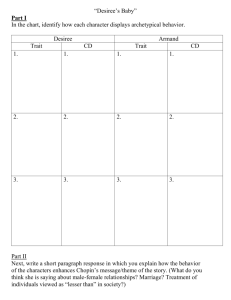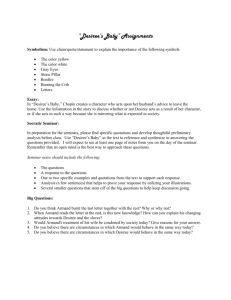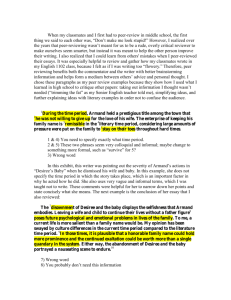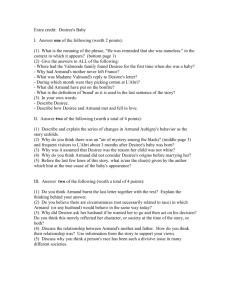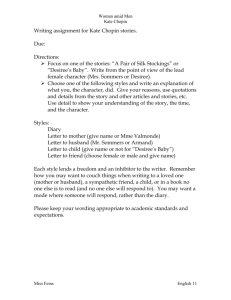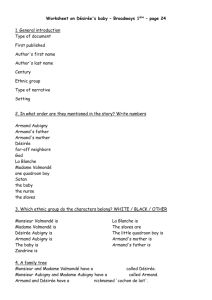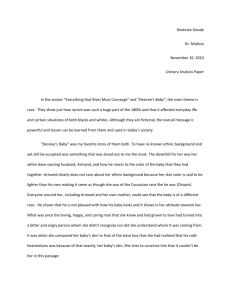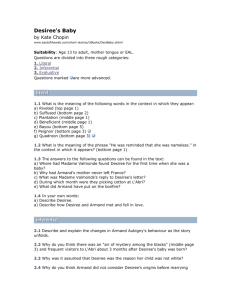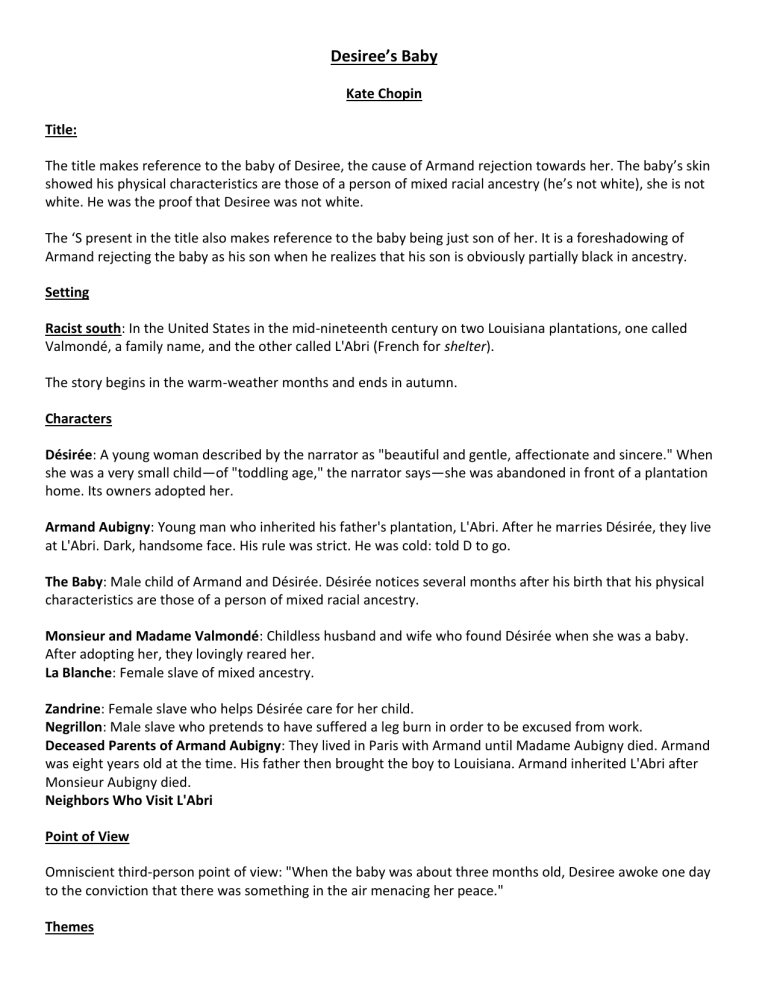
Desiree’s Baby Kate Chopin Title: The title makes reference to the baby of Desiree, the cause of Armand rejection towards her. The baby’s skin showed his physical characteristics are those of a person of mixed racial ancestry (he’s not white), she is not white. He was the proof that Desiree was not white. The ‘S present in the title also makes reference to the baby being just son of her. It is a foreshadowing of Armand rejecting the baby as his son when he realizes that his son is obviously partially black in ancestry. Setting Racist south: In the United States in the mid-nineteenth century on two Louisiana plantations, one called Valmondé, a family name, and the other called L'Abri (French for shelter). The story begins in the warm-weather months and ends in autumn. Characters Désirée: A young woman described by the narrator as "beautiful and gentle, affectionate and sincere." When she was a very small child—of "toddling age," the narrator says—she was abandoned in front of a plantation home. Its owners adopted her. Armand Aubigny: Young man who inherited his father's plantation, L'Abri. After he marries Désirée, they live at L'Abri. Dark, handsome face. His rule was strict. He was cold: told D to go. The Baby: Male child of Armand and Désirée. Désirée notices several months after his birth that his physical characteristics are those of a person of mixed racial ancestry. Monsieur and Madame Valmondé: Childless husband and wife who found Désirée when she was a baby. After adopting her, they lovingly reared her. La Blanche: Female slave of mixed ancestry. Zandrine: Female slave who helps Désirée care for her child. Negrillon: Male slave who pretends to have suffered a leg burn in order to be excused from work. Deceased Parents of Armand Aubigny: They lived in Paris with Armand until Madame Aubigny died. Armand was eight years old at the time. His father then brought the boy to Louisiana. Armand inherited L'Abri after Monsieur Aubigny died. Neighbors Who Visit L'Abri Point of View Omniscient third-person point of view: "When the baby was about three months old, Desiree awoke one day to the conviction that there was something in the air menacing her peace." Themes Racism(deleterious and irrational effect of racism): Madame Velmondé looks at the baby strangely since she noticed sth (his colour). - As master of the L'Abri plantation, he is a strict taskmaster who treats the slaves harshly—so much so, the narrator says, that the “negroes had forgotten how to be gay." - Armand changes his behaviour towards Desiree because of the baby’s colour. He feels that she and God have injured his home and his name.When Armand discovers that the child has Negro blood, he becomes sullen and cruel, and he makes it known that his wife and child are no longer welcome at L'Abri. He even tries to erase their memory by burning all their clothing and household items. -Even Desiree acts as racist: “A quick conception of all that this accusation meant for her nerved her with unwonted courage to deny it. “It is a lie; it is not true, I am white! Look at my hair, it is brown; and my eyes are gray, Armand, you know they are gray. And my skin is fair,” seizing his wrist. “Look at my hand; whiter than yours, Armand,” she laughed hysterically. However, it is likely that what distresses Désirée is not her and her baby's racial heritage. Rather, it is a fear that Armand will reject them because he views them as racially impure. Her fear, of course, is well founded. Gender Bias(presumed inferiority of women, dependence on a husband) Women are subordinate to men. As a husband, Armand clearly rules the home. “When he frowned, [Désirée] trembled," the narrator observes. “When he smiled, she asked no greater blessing of God." “Armand is the proudest father in the parish, I believe, chiefly because it is a boy, to bear his name; though he says not,—that he would have loved a girl as well. But I know it isn't true." In other words, Armand judges the worth of the child according to its gender (in addition to its race). Prejudice SKIN Armand loved Désirée's outer beauty, not her inner beauty. He also rejected his child, for its skin exhibited a taint of impurity. Finally, like other Old South plantation owners, he viewed the blackness of his slaves as a defect that colored even their souls. However, conversation between Désirée and Madame Valmondé indicates that he apparently found time for La Blanche, the slave woman whose name (French for white) suggests that she was of mixed heritage, with light skin that made her a tolerable sexual object for Armand. Désirée, speaking of the loudness of her baby's crying, says, “Armand heard him the other day as far away as La Blanche's cabin." Real Love Is Colorblind!!!! Just DESIRE The narrator says Armand "no longer loved [Désirée] because of the unconscious injury she had brought upon his home and his name." Rejecting her because he believes she is of mixed heritage indicates that he never truly loved her in the first place. Real love is colorblind. On the other hand, after Désirée informs her mother of developments at L'Abri, Madame Valmondé tells her in a return letter, ""My own Desiree: Come home to Valmondé; back to your mother who loves you. Come with your child." Climax When Désirée realizes that her baby is of mixed racial heritage. Foreshadowings Désirée's "Obscure Origin" Désirée's ancestry included a black African. The following passage—describing Armand's attitude regarding the lack of information about Désirée's family history—foreshadows his assumption that Désirée's ancestry included a black African. L'Abri's Appearance Sadness, Problems. The foreboding appearance of the exterior of Armand's home reflects his inner world and foreshadows the malevolence that possesses him after Désirée questions him about their child. "It was a sad looking place. . . . The roof came down steep and black like a cowl, reaching out beyond the wide galleries that encircled the yellow stuccoed house. Big, solemn oaks grew close to it, and their thick-leaved, far-reaching branches shadowed it like a pall." (Armand's Complexion) he also has black ancestors. "Look at my hand; whiter than yours, Armand," Figures of speech IRONY: When Armand discovers that it is he who is of mixed racial ancestry. The fact that Armand is darker than her makes no difference to him, but is important to the story, leading to the final irony -- it was Armand's mother who was black. His father had concealed the fact by living with her in Paris & moving back to Louisiana without her. L’Abri means shelter in French, it was not a shelter for Desiree and his baby, on the contrary she felt sad and excluded. Desiree’s child becomes fatherless after Armand rejects his wife and the boy. Eighteen years before, Désirée, was fatherless when Monsieur Valmondé found her. Metaphor: [Désirée] was striving to penetrate the threatening mist that she felt closing about her the atmosphere in Desiree’s room = a mist "Armand," she called to him, in a voice which must have stabbed him Désirée's voice = a knife Alliteration: And the very spirit of Satan seemed suddenly to take hold of him Simile: The passion that awoke in him that day, when he saw her at the gate, swept along like an avalanche, or like a prairie fire. . . / The roof came down steep and black like a cowl / The blood turned like ice in her veins / She was like a stone image: silent, white, motionless after she placed it there. Simbols L'Abri: The foreboding appearance of this plantation home symbolizes Armand's dark moods. Bonfire: The destruction of the memory of Desiree and the baby. October sunset: The ending of Desiree’s marriage to Armand. Conflicts Love vs. resentment (man vs. man): Desiree’s love towards Armand and Armand’s rejection and resentment. Man vs. society: Desiree’s origin, black heritage confronted to a racist society in which being black was considered a disgrace. Questions Did Desiree die? Yes, we know this because of the description of her departure. She did not take the broad, beaten road which led to the far-off plantation of Valmondé. She walked across a deserted field, where the stubble bruised her tender feet, so delicately shod, and tore her thin gown to shreds. “She disappeared among the reeds and willows that grew thick along the banks of the deep, sluggish bayou; and she did not come back again.” Was Armand aware of his mother's ancestry? Armand was definitely not aware of his mother's ancestry. When Desiree becomes aware of the dark skin of her baby, she asked Armand what the meaning of this is. The answer that Armand gives her clearly displays Armand's belief in his own pure bloodline and condemns her and his child for their racial impurity: "It means," that the child is not white; it means that you are not white. What does the letter which Armand's mother wrote to his father symbolize? "But, above, all," she wrote, "night and day, I thank the good God for having so arranged our lives that our dear Armand will never know that his mother, who adores him, belongs to the race that is cursed with the brand of slavery." It’s an example of situational irony, as we realise that the dark-skinned gene came not from Desiree, as Armand had assumed. Armand's mother thanks God that her son can remain ignorant of this fact because of the way it would have affected his standing in society, yet ironically his mother's success in this respect gives rise to Armand's greatest tragedy, as he loses his loving wife and child. As such, we could argue that the letter symbolises mistaken good intentions: Armand's mother saw it as a good thing that Armand remained ignorant of his genetic background, but the tragedy of the story clearly shows that she was wrong. Jumping to conclusions: Desiree with no known relations seems to be the easy person to blame for the dark skin of her child, whereas in fact it was Armand who was responsible. Appearances may not always be what they seem. What was Kate Chopin's purpose in the story? Takes place before the Civil War in Louisiana. The author emphasizes three controversial subjects in her story: racism, prejudice, and marriage. One of her purposes was to expose the inequities of prejudice and female subjugation.
